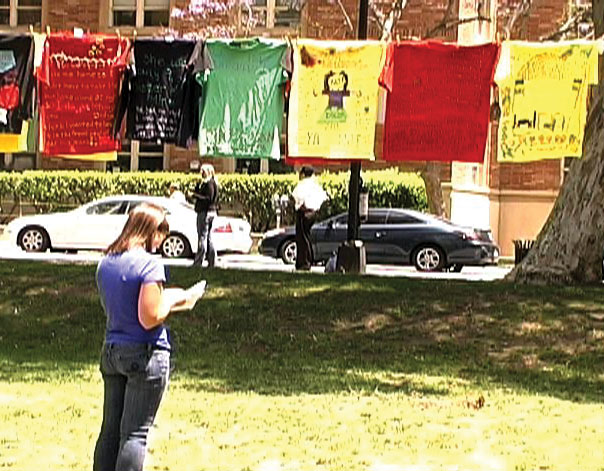For parts of high school and college, Kylie was in an emotionally abusive relationship, and not even her family believed her.
Her then-boyfriend would often put her down verbally, and the relationship was bordering on physical abuse when they were in private.
“The way he presented himself to everyone else was so different,” Kylie said, adding that even now, her family still does not believe her about her then-boyfriend’s actions. She requested to be called only by her first name.
But Kylie, a third-year sociology student, found a way to express her story in an unusual way: by creating a T-shirt.
Hundreds of T-shirts, each with a story, a message or a dedication written on it, are displayed in Schoenberg Quad for the annual Clothesline Project.
It aims to raise awareness about sexual violence and celebrate the survivors, said Evelyn Pastene, a co-internal director of the project.
“These stories aren’t just words on paper,” Kylie said. “People put their hearts into making these shirts, and it makes a huge difference.”
She referred to personal experience, noting that it is easy to feel alone or to take the blame for what happened, even though it is someone else’s fault.
“This project celebrates the legitimacy of people. It’s like saying, “˜We hear you,'” Kylie said.
Since the UCLA chapter was established in 1997, the collection of shirts has been growing.
Many are made on campus by students and faculty alike, though a fraction also come from the Santa Monica-UCLA Rape Treatment Center and the Young Women’s Christian Association in Compton, Pastene said.
The shirts are eclectic and of different shapes and colors. Each color represents a different type of sexual violence. Red, representing survivors of rape and sexual assault, was the most prevalent.
Kylie stressed the importance of linking incidents of sexual violence to humanized stories.
People care more when the issue speaks to them personally, she said. Often they brush the issue aside, unless they, or a person they know, is affected.
According to the project, creating shirts helps survivors take the first step toward healing. Some who have never shared their experiences with others are breaking the silence they have held for so long.
While some involved in the project have been personally affected by these types of violence, others, such as Pastene, were simply moved by the display and the messages conveyed.
There is a shock factor to what the project is doing here, she said.
“It informs passersby and makes them aware that these incidents do happen right here on campus,” she added.
Lauren Davidson, a law student, said she was moved by the T-shirt messages as she walked through the display and said she stopped to take a closer look.
“Sexual violence is such a silent epidemic,” she said. “This project is great because it’s in your face. You can’t ignore it, and it brings such an important issue to light.”
Most people know somebody who has been affected by these types of violence, and Davidson said she has seen the hurt and destruction it causes, noting that it can happen to anyone.
The project will culminate tonight with Take Back the Night, an event in which survivors will get to share their experiences and support one another.
As the collection of T-shirts grows, the coordinators are hoping that the project’s message spreads and reaches out to those in need.
“A woman came by today to make a shirt for an event that happened in 1965,” Kylie said. “That just shows how much (sexual violence) can affect a person’s life, and why these issues are so important.”
